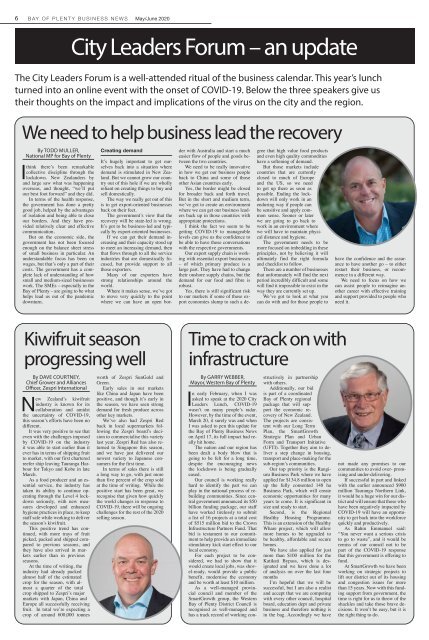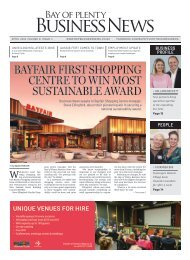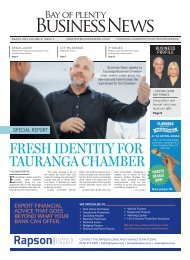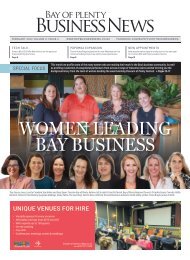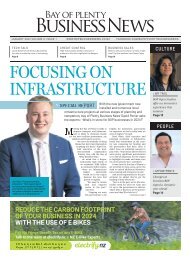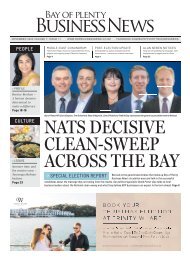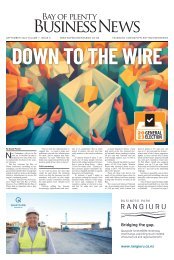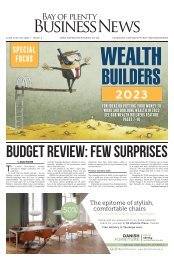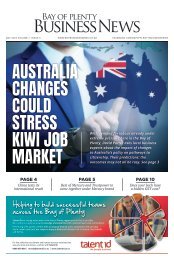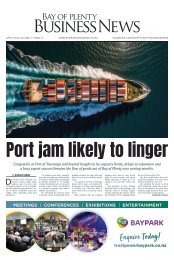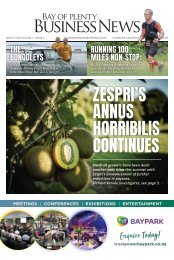May/June 2020 - BAY OF PLENTY BUSINESS NEWS
From mid -2016 Bay of Plenty businesses have a new voice, Bay of Plenty Business News. This new publication reflects the region’s growth and importance as part of the wider central North Island economy.
From mid -2016 Bay of Plenty businesses have a new voice, Bay of Plenty Business News. This new publication reflects the region’s growth and importance as part of the wider central North Island economy.
You also want an ePaper? Increase the reach of your titles
YUMPU automatically turns print PDFs into web optimized ePapers that Google loves.
6 <strong>BAY</strong> <strong>OF</strong> <strong>PLENTY</strong> <strong>BUSINESS</strong> <strong>NEWS</strong> <strong>May</strong>/<strong>June</strong> <strong>2020</strong><br />
City Leaders Forum – an update<br />
The City Leaders Forum is a well-attended ritual of the business calendar. This year’s lunch<br />
turned into an online event with the onset of COVID-19. Below the three speakers give us<br />
their thoughts on the impact and implications of the virus on the city and the region.<br />
We need to help business lead the recovery<br />
By TODD MULLER,<br />
National MP for Bay of Plenty<br />
I<br />
think there’s been remarkable<br />
collective discipline through the<br />
lockdown. New Zealanders by<br />
and large saw what was happening<br />
overseas, and thought, “we’ll put<br />
our best foot forward” and they did.<br />
In terms of the health response,<br />
the government has done a pretty<br />
good job, helped by the advantages<br />
of isolation and being able to close<br />
our borders. And they have provided<br />
relatively clear and effective<br />
communication.<br />
But on the economic side, the<br />
government has not been focused<br />
enough on the balance sheet stress<br />
of small business in particular. An<br />
understandable focus has been on<br />
wages, but that’s only a part of their<br />
costs. The government has a complete<br />
lack of understanding of how<br />
small and medium-sized businesses<br />
work. The SMEs – especially in the<br />
Bay of Plenty – are going to be what<br />
helps lead us out of the pandemic<br />
downturn.<br />
Creating demand<br />
It’s hugely important to get ourselves<br />
back into a situation where<br />
demand is stimulated in New Zealand.<br />
But we cannot grow our country<br />
out of this hole if we are wholly<br />
reliant on creating things to buy and<br />
sell domestically.<br />
The way we really get out of this<br />
is to get export-oriented businesses<br />
back on their feet.<br />
The government’s view that the<br />
recovery will be state-led is wrong.<br />
It’s got to be business-led and typically<br />
by export-oriented businesses.<br />
If we can get their demand increasing<br />
and their capacity stood up<br />
to meet an increasing demand, then<br />
that flows through to all the service<br />
industries that are domestically focused,<br />
but provide support to all<br />
those exporters.<br />
Many of our exporters have<br />
strong relationships around the<br />
world.<br />
Where it makes sense, we’ve got<br />
to move very quickly to the point<br />
where we can have an open border<br />
with Australia and start a much<br />
easier flow of people and goods between<br />
the two countries.<br />
We need to be really innovative<br />
in how we get our business people<br />
back to China and some of those<br />
other Asian countries early.<br />
Yes, the border might be closed<br />
for broader back and forth travel.<br />
But in the short and medium term,<br />
we’ve got to create an environment<br />
where we can get our business leaders<br />
back up in those countries with<br />
appropriate protections.<br />
I think the fact we seem to be<br />
getting COVID-19 to manageable<br />
levels can give us the confidence to<br />
be able to have those conversations<br />
with the respective governments.<br />
Our export supply chain is working<br />
with essential export businesses<br />
– of which primary produce is a<br />
large part. They have had to change<br />
their onshore supply chains, but the<br />
demand for our food and fibre is<br />
robust.<br />
Yes, there is still significant risk<br />
to our markets if some of those export<br />
economies slump to such a degree<br />
that high value food products<br />
and even high quality commodities<br />
have a softening of demand.<br />
But those markets include<br />
countries that are currently<br />
closed to much of Europe<br />
and the US, so we need<br />
to get up there as soon as<br />
possible. Ending the lockdown<br />
will only work in an<br />
enduring way if people can<br />
be sensitive and apply common<br />
sense. Sooner or later<br />
we are going to go back to<br />
work in an environment where<br />
we will have to maintain physical<br />
distance and hygiene.<br />
The government needs to be<br />
more focused on imbedding in these<br />
principles, not by believing it will<br />
ultimately find the right formula<br />
and checklist to follow.<br />
There are a number of businesses<br />
that unfortunately will find the next<br />
period incredibly difficult and some<br />
will find it impossible to exist in the<br />
way they are currently set up.<br />
We’ve got to look at what you<br />
can do with and for those people to<br />
have the confidence and the assurance<br />
to have another go – to either<br />
restart their business, or recommence<br />
in a different way.<br />
We need to focus on how we<br />
can assist people to reimagine another<br />
career with effective training<br />
and support provided to people who<br />
need it.<br />
Kiwifruit season<br />
progressing well<br />
Time to crack on with<br />
infrastructure<br />
By DAVE COURTNEY,<br />
Chief Grower and Alliances<br />
Officer, Zespri International<br />
New Zealand’s kiwifruit<br />
industry is known for its<br />
collaboration and amidst<br />
the uncertainty of COVID-19,<br />
this season’s efforts have been no<br />
different.<br />
It was very positive to see that<br />
even with the challenges imposed<br />
by COVID-19 on the industry<br />
it was able to start earlier than it<br />
ever has in terms of shipping fruit<br />
to market, with our first chartered<br />
reefer ship leaving Tauranga Harbour<br />
for Tokyo and Kobe in late<br />
March.<br />
As a food producer and an essential<br />
service, the industry has<br />
taken its ability to continue operating<br />
through the Level 4 lockdown<br />
seriously, with new measures<br />
developed and enhanced<br />
hygiene practices in place, to keep<br />
staff safe while working to deliver<br />
the season’s kiwifruit.<br />
This positive trend has continued,<br />
with more trays of fruit<br />
picked, packed and shipped compared<br />
to previous seasons, and<br />
they have also arrived in markets<br />
earlier than in previous<br />
seasons.<br />
At the time of writing, the<br />
industry had already packed<br />
almost half of the estimated<br />
crop for the season, with almost<br />
a quarter of the total<br />
crop shipped to Zespri’s major<br />
markets with Japan, China and<br />
Europe all successfully receiving<br />
fruit. In total we’re expecting a<br />
crop of around 600,000 tonnes<br />
worth of Zespri SunGold and<br />
Green.<br />
Early sales in our markets<br />
like China and Japan have been<br />
positive, and though it’s early in<br />
the season, we have seen strong<br />
demand for fresh produce across<br />
other key markets.<br />
We’ve also had Zespri Red<br />
back in local supermarkets following<br />
the Zespri board’s decision<br />
to commercialise this variety<br />
last year. Zespri Red has also returned<br />
to Singapore this season,<br />
and we have just delivered our<br />
newest variety to Japanese consumers<br />
for the first time.<br />
In terms of sales there is still<br />
a long way to go, with just more<br />
than five percent of the crop sold<br />
at the time of writing. While the<br />
positive start has been great, we<br />
recognise that given how quickly<br />
the world changes in response to<br />
COVID-19, there will be ongoing<br />
challenges for the rest of the <strong>2020</strong><br />
selling season.<br />
By GARRY WEBBER,<br />
<strong>May</strong>or, Western Bay of Plenty<br />
In early February, when I was<br />
asked to speak at the <strong>2020</strong> City<br />
Leaders Lunch, COVID-19<br />
wasn’t on many people’s radar.<br />
However, by the time of the event,<br />
March 20, it surely was and when<br />
I was asked to pen this update for<br />
the Bay of Plenty Business News<br />
on April 17, its full impact had really<br />
hit home.<br />
The nation and our region has<br />
been dealt a body blow that is<br />
going to be felt for a long time,<br />
despite the encouraging news<br />
the lockdown is being gradually<br />
eased.<br />
Our council is working really<br />
hard to identify the part we can<br />
play in the national process of rebuilding<br />
communities. Since central<br />
government announced its $50<br />
billion funding package, our staff<br />
have worked tirelessly to submit<br />
a list of 16 projects at a total cost<br />
of $515 million bid to the Crown<br />
Infrastructure Partners Fund. That<br />
bid is testament to our commitment<br />
to help provide an immediate<br />
stimulatory kick start effect to our<br />
local economy.<br />
For each project to be considered,<br />
we had to show that it<br />
would create local jobs, was shovel-ready,<br />
would provide a public<br />
benefit, modernise the economy<br />
and be worth at least $10 million.<br />
As a well-managed provincial<br />
council and member of the<br />
SmartGrowth group, the Western<br />
Bay of Plenty District Council is<br />
recognised as well-managed and<br />
has a track record of working constructively<br />
in partnership<br />
with others.<br />
Additionally, our bid<br />
is part of a coordinated<br />
Bay of Plenty regional<br />
package that will support<br />
the economic recovery<br />
of New Zealand.<br />
The projects are consistent<br />
with our Long Term<br />
Plan, the SmartGrowth<br />
Strategic Plan and Urban<br />
Form and Transport Initiative<br />
(UFTI). Together they aim to deliver<br />
a step change in housing,<br />
transport and place-making for the<br />
sub-region’s communities.<br />
Our top priority is the Rangiuru<br />
Business Park where we have<br />
applied for $134.8 million to open<br />
up the fully consented 148 ha<br />
Business Park, which will create<br />
economic opportunities for many<br />
years to come. It is significant in<br />
size and ready to start.<br />
Second, is the Regional<br />
Healthy Housing Programme.<br />
This is an extension of the Healthy<br />
Whare project, which will allow<br />
more homes to be upgraded to<br />
be healthy, affordable and secure<br />
homes.<br />
We have also applied for just<br />
more than $100 million for the<br />
Katikati Bypass, which is designated<br />
and we have done a lot<br />
of analysis on over the last four<br />
months<br />
I’m hopeful that we will be<br />
successful, but I am also a realist<br />
and accept that we are competing<br />
with every other council, hospital<br />
board, education dept and private<br />
business and therefore nothing is<br />
in the bag. Accordingly we have<br />
not made any promises to our<br />
communities to avoid over- promising<br />
and under-delivering.<br />
If successful in part and linked<br />
with the earlier announced $900<br />
million Tauranga Northern Link,<br />
it would be a huge win for our district<br />
and will ensure that those who<br />
have been negatively impacted by<br />
COVID-19 will have an opportunity<br />
to get back into the workforce<br />
quickly and productively.<br />
As Rahm Emmanuel said:<br />
“You never want a serious crisis<br />
to go to waste”, and it would be<br />
remiss of our council not to be<br />
part of the COVID-19 response<br />
that this government is offering to<br />
fund.<br />
At SmartGrowth we have been<br />
working on strategic projects to<br />
lift our district out of its housing<br />
and congestion issues for more<br />
than 15 years. Now with this funding<br />
support from government, the<br />
time is right for us to throw of the<br />
shackles and take those brave decisions.<br />
It won’t be easy, but it is<br />
the right thing to do.


